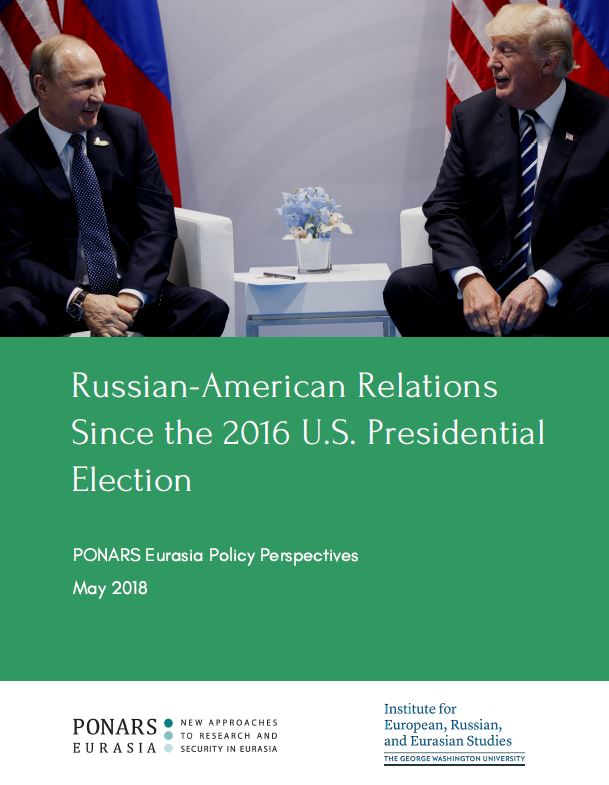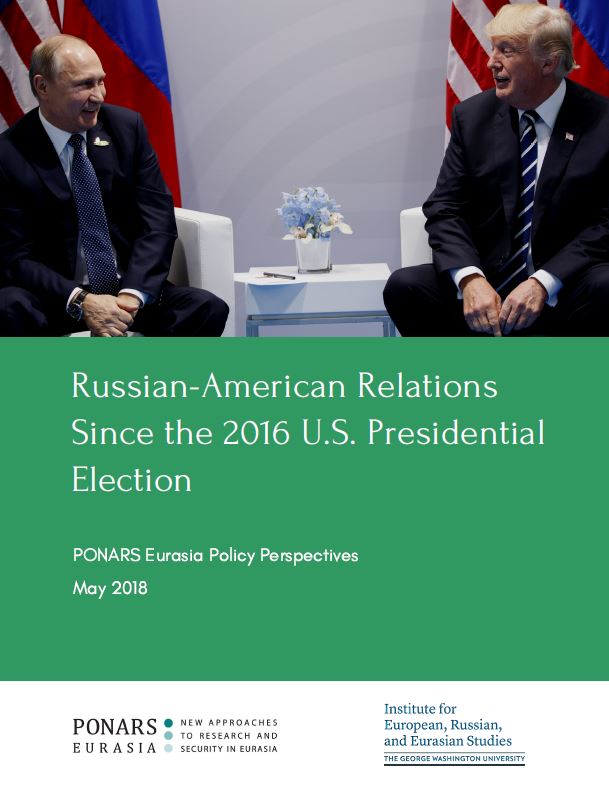On the one-year anniversary of Donald Trump’s election as U.S. president, PONARS Eurasia and New York University’s Jordan Center for the Advanced Study of Russia hosted a joint conference that brought together leading scholars to discuss the state of U.S.-Russian/Eurasian relations. The papers in this volume are drawn from this event. Joshua Tucker, director of the Jordan Center, opened the conference and asked two key questions: Have U.S.-Russian relations changed one year into Trump’s presidency? How are relations between the two nations expected to develop in the future?
In the first section of this collection, Arkady Moshes, Finnish Institute of International Affairs, Mikhail Alexseev, San Diego University, and Adam Stulberg, Georgia Institute of Technology, discuss recent U.S. and Russian foreign and domestic policies and their impacts on the bilateral relationship. In his paper, Moshes describes the “sober” foreign policy viewpoints held by the Russian establishment and states that the 2016-17 euphoria about a quick fix to Russian-Western relations on Moscow’s terms appears to have faded away. Alexseev posits that Trump’s inclinations to improve U.S.-Russian relations hit congressional resistance and that the body even showed its own capacity to have a role in U.S. foreign policymaking. Stulberg analyzes the interdependent energy and gas networks within the fold of Western energy sanctions on Russia. He asserts that if policymakers in Washington, Brussels, and Moscow can get a grip on the downward spiral in political relations, the “energy equation” has the most potential to re-ground strategic ties.
The second part focuses on Ukraine and Syria and consists of papers by Oleхiy Haran, University of Kyiv-Mohyla Academy and Petro Burkovsky, National Institute for Strategic Studies, Ekaterina Stepanova, Institute of the World Economy and International Relations (Russia), and Pavel Baev, Peace Research Institute Oslo. Haran and Burkovsky claim that the Donbas peace process has not worked and that a new approach involving the supply of U.S. lethal defensive weapons to Ukraine could create conditions that prompt Russian forces to back down and stabilization to take hold in Donbas. Stepanova writes that Russia seeks to diminish its ownership of the “Syria problem” while keeping and expanding its multiple partnerships in the broader Middle East. Baev states that there is incompatibility in the political agendas on counterterrorism of the West and Russia and that Putin’s actions rather than his words mean that Russia would be a poor ally in the complex struggle against terrorism.
The third group of papers is by Ivan Kurilla, European University at St. Petersburg, Serghei Golunov, Kyushu University, Marlene Laruelle, George Washington University, and Alexandra Yatsyk, Kazan Federal University. Kurilla reflects on the history of U.S.-Russian relations and reminds us that “Red Scares” have happened in the United States before, just as it is now—a key element to comprehend the domestic U.S. political underpinnings of surges in anti-Russian sentiments. Golunov addresses the rise of conspiracy theories in the United States and Russia, saying that both sides take great strides to discount the other when their relations are highly contentious, with the conspiralogical realm not spared. Laruelle contends that Russia’s soft power in the United States and its links with the U.S. far right demonstrate a confluence of interests rather than an influence on U.S. public opinion. Yatsyk explores patriotic themes in Russian pop culture with a close look at the stage shows put on by the infamous Russian Night Wolves biker club. She highlights the show’s anti-American propaganda and reveals how they function as calls to bring on board Russian patriots in the Kremlin’s fight against the West.
View more: E-Books/Policy Perspectives










